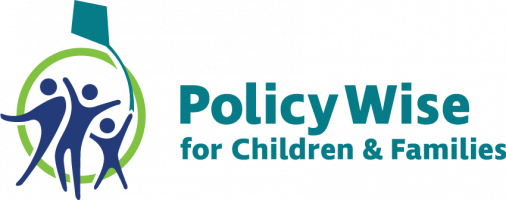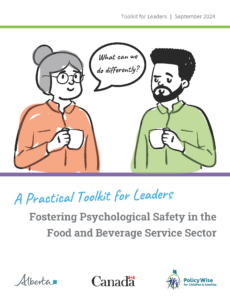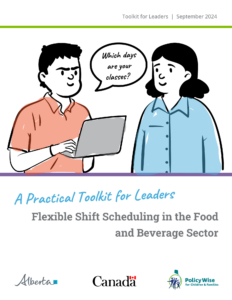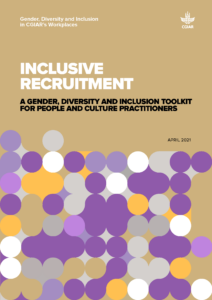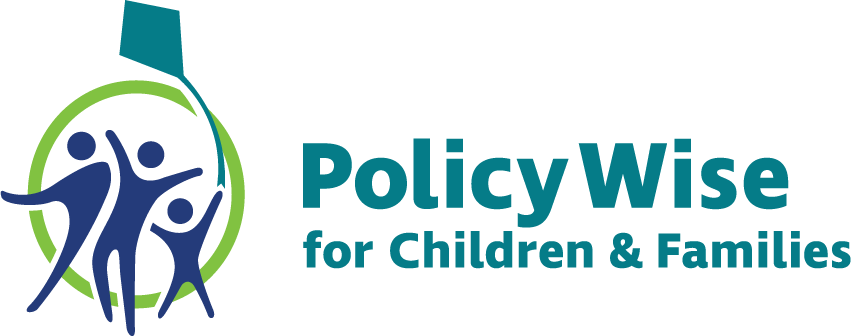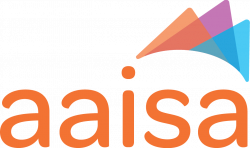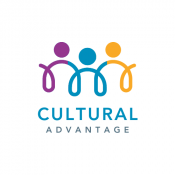Building Inclusive Workplaces
Newcomer Young Adult Employment in the Food & Beverage Sector
Welcome to your journey towards creating a more equitable, diverse, and inclusive workplace. By fostering inclusivity, you can make your workplace more attractive to newcomer young adults. It will also improve overall staff recruitment, retention, and well-being. Whether you’re new to equity, diversity, and inclusion (EDI) or looking to deepen your knowledge, our training materials are designed to meet your needs.

How it Works
These training materials are intended for supervisors, operators, managers, and executive chefs in the food and beverage (F&B) sector. These positions are referred to as “leaders” throughout these materials.
We understand that every leader has different needs and interests when it comes to building their EDI capacity. That’s why we’ve designed a flexible learning experience, allowing you to choose your own path. Explore the content that best fits your current challenges and goals.
Your Learning, Your Way
Whether you’re beginning to explore EDI or are ready to dive deep into specific areas, our materials are designed to support you. Here’s how you can navigate your learning journey:
![]() Start with the Foundations of EDI online training modules if you’re new to these concepts and would find a comprehensive overview helpful or want a refresher.
Start with the Foundations of EDI online training modules if you’re new to these concepts and would find a comprehensive overview helpful or want a refresher.
![]() Dive into the Toolkits if you’re facing specific challenges around psychological safety, inclusive recruitment, or want to add more flexibility into how you schedule your staff.
Dive into the Toolkits if you’re facing specific challenges around psychological safety, inclusive recruitment, or want to add more flexibility into how you schedule your staff.
![]() Watch the Micro-Learning Videos for quick tips and insights on intercultural competence that you can apply immediately in your daily work.
Watch the Micro-Learning Videos for quick tips and insights on intercultural competence that you can apply immediately in your daily work.
Stop, Reflect & Take Action
As you progress through the training, you’ll explore key EDI concepts and engage in reflection and action-oriented activities.
These activities are essential for applying what you’ve learned in practical ways that will make a lasting impact.
We encourage you to divide your training time equally between learning the content and completing the self-guided reflection and action-oriented activities found throughout the training materials.

The Training Materials
 For any questions or additional support, contact info@policywise.com.
For any questions or additional support, contact info@policywise.com.
Foundations of EDI Online Learning Modules
Deepen your understanding of the core concepts of EDI. Perfect for those starting their EDI journey or looking to solidify their foundational knowledge.
Each module will take about 25 minutes to complete.
Introduction: Enhancing EDI in Alberta's Food and Beverage Sector
- Welcome you to the online learning modules
- Describe what you will learn
- Identify the learning objectives
Module 1: EDI Awareness and Cultural Competence
- Describe the importance of EDI in the workplace
- Connect culture beyond visible aspects
- Use inclusive and respectful language
- Promote cultural competence
Module 2: Intercultural Competence
- Define intercultural competence
- Identify ways of navigating and resolving conflicts
- Promote inclusive leadership
- Describe communication and management styles
Module 3: Accountability and Transparency
- Describe workplace information and policies
- Define the concept of No Fear but Fair policies
- Promote inclusive workplaces for all
- Share workplace commitment for employer-employee support
Module 4: Bias Awareness, Allyship, and Advocacy
- Establish a culture of respect and support
- Identify ways to break the bias
- Be an influential ally
- Promote awareness and mitigation strategies
- Build a collaborative network for employer-employee support
Module 5: Continuous Learning
- Set EDI best practices
- Work on actionable feedback
- Leverage inclusion and diversity training for all
- Create a sustainable EDI awareness in the workplace
The Alberta Association of Immigrant Serving Agencies (AAISA) collaborated on developing these modules.
The AAISA is a non-profit umbrella organization representing agencies that provide resettlement, settlement, and integration services to newcomers in Alberta. They are building capacity to better serve newcomers by fostering collaboration, professionalization, and member-driven research and policy work.
Practical Toolkits for Leaders
Equip yourself with practical tools and strategies to create a psychologically safer and more adaptable workplace. Ideal for leaders who want to put in place specific EDI practices immediately.
 Psychological safety in the workplace is where all team members feel included and safe to learn, contribute, and challenge current work practices. Integrating actions to support psychological safety in the workplace is key in supporting newcomer young adult well-being. This is because it fosters a culture of inclusion, learning, growth, and a sense of belonging.
Psychological safety in the workplace is where all team members feel included and safe to learn, contribute, and challenge current work practices. Integrating actions to support psychological safety in the workplace is key in supporting newcomer young adult well-being. This is because it fosters a culture of inclusion, learning, growth, and a sense of belonging.
Flexible shift scheduling is a way to create work schedules that emphasize employee preferences and capacities while meeting business needs. Integrating actions that accommodate flexible shift scheduling in the workplace is key in supporting newcomer young adult well-being. This is because it fosters a work-life balance and a supportive workplace.
Although we did not develop this toolkit, we want to ensure you can access it. This toolkit provides practical actions to make the recruitment process more inclusive and supportive of diversity. The Consultative Group on International Agricultural Research developed this toolkit to support a different sector. However, leaders in the F&B sector can use many of its considerations and approaches.
PolicyWise for Children & Families developed the Psychological Safety and the Flexible Shift Scheduling toolkits.
PolicyWise for Children & Families informs, identifies, and promotes effective social policy and practice to improve the well-being of children, families, and communities.
Micro-Learning Videos
Quick, actionable insights into EDI-related topics. Perfect for busy leaders who need bite-sized learning, they can apply them on the go.
 Tips for Creating a More Interculturally Supportive Workplace
Tips for Creating a More Interculturally Supportive Workplace
This video provides tips and practices for creating an interculturally supportive workplace, which will boost morale and enhance employee retention.
 Acronyms and Industry-Specific Terminology
Acronyms and Industry-Specific Terminology
This video looks at why acronyms and industry-specific terms are challenging. It also provides strategies to support newcomers when learning the language of their workplace.
 Indirect Communication Style
Indirect Communication Style
This video looks at the difference between direct and indirect communication. It explores how different communication styles can cause workplace complications and how to adjust communications to ensure clarity.
 Being on Time
Being on Time
This video examines how people from around the world view time differently. It also provides strategies for being clear on expectations to avoid misunderstandings about timeliness in the workplace.
 Differences in Eye Contact
Differences in Eye Contact
This video examines how eye contact differs in Canada from other parts of the world. It also explores why newcomers may avoid eye contact and how understanding cultural norms can strengthen your engagement with newcomer employees and customers.
 Not Leaving at the End of the Day
Not Leaving at the End of the Day
This video examines why newcomer employees may not leave work at the end of their shift. It also emphasizes the importance of understanding cultural differences when establishing and communicating workplace expectations.
Cultural Advantage collaborated with PolicyWise for Children & Families on developing these videos.
Cultural Advantage is a social enterprise of the Edmonton Newcomer Centre. It enables Alberta employers to grow and thrive on the strength of their diverse, engaged workforces. The aim is to create robust work environments that allow workers to feel more stable, happy, and fulfilled.
Recipe for Retention Webinar
After two years of research and collaboration, we hosted an informative webinar exploring our work to understand and address the employment needs of newcomer young adults in Alberta’s F&B sector.
The F&B sector is struggling with high staff turnover and vacancy rates, worsened by the COVID-19 pandemic. Meanwhile, newcomer young adults—those aged 18 to 29 who arrived in Canada within the last five years—face an unemployment rate nearly double the national average. Reducing the barriers that newcomer young adults face when entering the F&B sector can attract newcomers and boost overall staff retention and well-being.
Recipe for Retention (Dec. 10, 2024)
During the webinar, we discussed:
Our Research: Learn about key findings from two years of research on the unique challenges faced by newcomer young adults in the F&B sector and how addressing these barriers benefits both employees and employers.
Our Solution: Get an inside look at the innovative, tested equity, diversity, and inclusion training materials we’ve developed specifically for the F&B sector.
How to Access the Training: Learn how you can access and start using these free equity, diversity, and inclusion-focused training materials in your organization or business to foster a more inclusive workplace and support newcomer employees.
Why This Training is Important
The Current Issue
The Canadian F&B sector has struggled with staff turnover and high vacancy rates. This trend was made worse by the COVID-19 pandemic. In December 2023, Alberta’s F&B sector had the highest vacancy rates in the province. One promising solution is to focus on hiring and retaining newcomer young adults aged 18 to 29 who arrived in Canada within the past five years. In 2020, this group had an unemployment rate of 19.8%.
Our Solution
Funded by Alberta’s Ministry of Jobs, Economy, and Trade, we at PolicyWise for Children & Families looked at how to increase recruitment and retention of newcomer young adults in the F&B sector. We partnered with F&B sector employers, sector associations, newcomer young adults, and community support agencies.
With our community partners, we developed training materials related to equity, diversity, and inclusion. To create the training material, we engaged with F&B sector business owners, association representatives, leaders, and newcomer young adults with experience working in the sector.
Our Competency Model
Michael A. Campion and their colleagues describe competency models or frameworks as a “collection of knowledge, skills, abilities and other characteristics that are required for effective job performance.” Documenting job-specific competencies and the resulting competency model can clarify roles and responsibilities, guide training and capacity-building needs, and support performance appraisals.
PolicyWise created a competency model based on our review of scholarly articles, reports, and websites from EDI organizations and F&B employers, as well as interviews with key informants. We identified 19 core EDI competencies for the F&B sector. We then organized these competencies into three sections:
- Foundations of EDI
- Leadership Development
- Practical Skills
In the competency model figure below, we present 19 competencies separately for clarity. However, keep in mind that they are interrelated and overlapping in practice. Competencies shaded in blue are ones that have been addressed to some extent throughout the training materials.
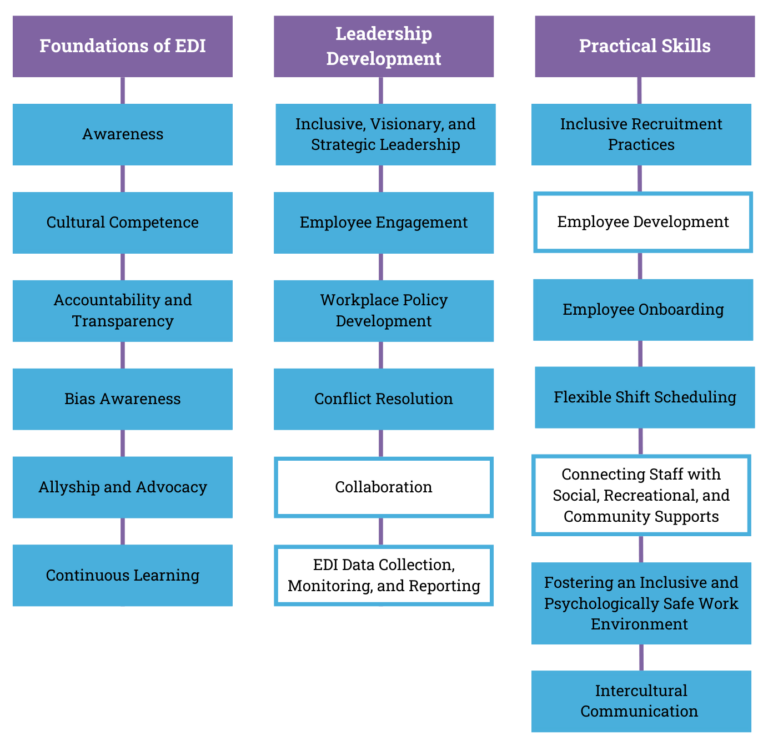
Foundations of Equity, Diversity, and Inclusion. Foundations of EDI lay the groundwork for creating positive change. A broad understanding of the principles and approaches to EDI is important for leaders to build an initial knowledge base from which to act.
Leadership Development. People in leadership positions hold an essential role in developing workplace culture. Having core leadership competencies in place supports leaders in engaging their employees, identifying opportunities for improvement, and managing the change employees will experience due to shifts in workplace practice.
Practical Skills. Practical skills refer to competencies leaders can use in the F&B sector to directly impact the recruitment and retention of newcomer young adults. These competencies ensure that F&B operators can recruit and retain newcomer young adults and that they can thrive in the sector.
Project Funders
The Government of Alberta is working in partnership with the Government of Canada to provide employment support programs and services.
